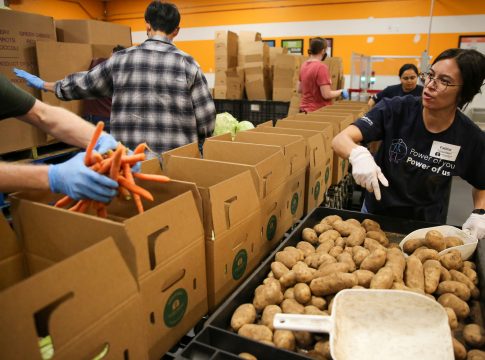The Heart of Our Communities: Why Supporting SNAP Means Supporting Us All
As our communities navigate the ebb and flow of economic challenges, one thing is clear: food is not just sustenance; it’s a lifeline. With the recent reductions in SNAP benefits—those crucial food stamps that help families make ends meet—the impact reverberates through our neighborhoods like the sizzling sound of a well-oiled skillet.
A Rising Tide of Need
Let’s talk numbers: in Santa Clara and San Mateo counties alone, Second Harvest is dishing out approximately 500,000 meals every month! That’s about one in every six residents relying on this nonprofit to keep their pantries stocked. In the East Bay, the stakes are equally high—one in four people grapples with food insecurity. These aren’t just statistics, but real families, often working hard yet still struggling to thrive in one of the priciest places in the nation.
Regi Young, the executive director of the Alameda County Community Food Bank, paints a vivid picture: “Families are juggling paying rent, utilities, and childcare, all while relying on the nutritional value of food assistance.” It’s a precarious balance that needs tipping in the right direction.
Nourishing Lives and Local Economies
Imagine each dollar spent on SNAP rippling through the local economy, generating a $1.80 boost! This isn’t just about putting food on the table; it’s an investment in our local grocers, farmers, and communities at large. Allison Goodwin from the Redwood Empire Food Bank highlights the snowball effect created by these benefits—a cycle of prosperity and nourishment intertwined.
But wait, there’s more! The proposed cuts to SNAP could mean a staggering 9.5 billion meals less each year. To put that into perspective, the entire charitable food system across the U.S. offers only 6.5 billion meals annually. It’s like serving a feast and then taking the entire roast turkey off the table—completely gutting the community spirit that food embodies.
The Dignity of Nourishment
The movement to safeguard SNAP isn’t just about filling bellies; it’s about dignity and stability. Caitlin Sly of the Food Bank of Contra Costa and Solano puts it succinctly: “Our federal government has always stepped in during crises. Right now, it seems like they’re creating one.”
Food, at its core, is a right—not a privilege. In a nation that has the capacity to nourish all its citizens, we must champion policies that allow us to thrive together.
Let’s Dish It Out!
The upcoming days may be uncertain, but you can play a role in combating food insecurity in your community. Want to help? Here are a few mouthwatering ways:
- Volunteer at a local food bank: The experience will leave you inspired and full of gratitude.
- Donate food: Non-perishable staples like canned beans, grains, and pasta are always welcomed.
- Spread the word: Educate friends and family on the importance of SNAP and its role in supporting communities.
Together, we can elevate the conversation around food to not only include delicious experiences but also community welfare. So, let’s whip up some change in our kitchens and our communities! 💚🥦🍞✨

Covers wellness, nutrition, mental health, and daily life tips.
Bio: Talia brings a background in health journalism and holistic living to help readers live better, one tip at a time.

